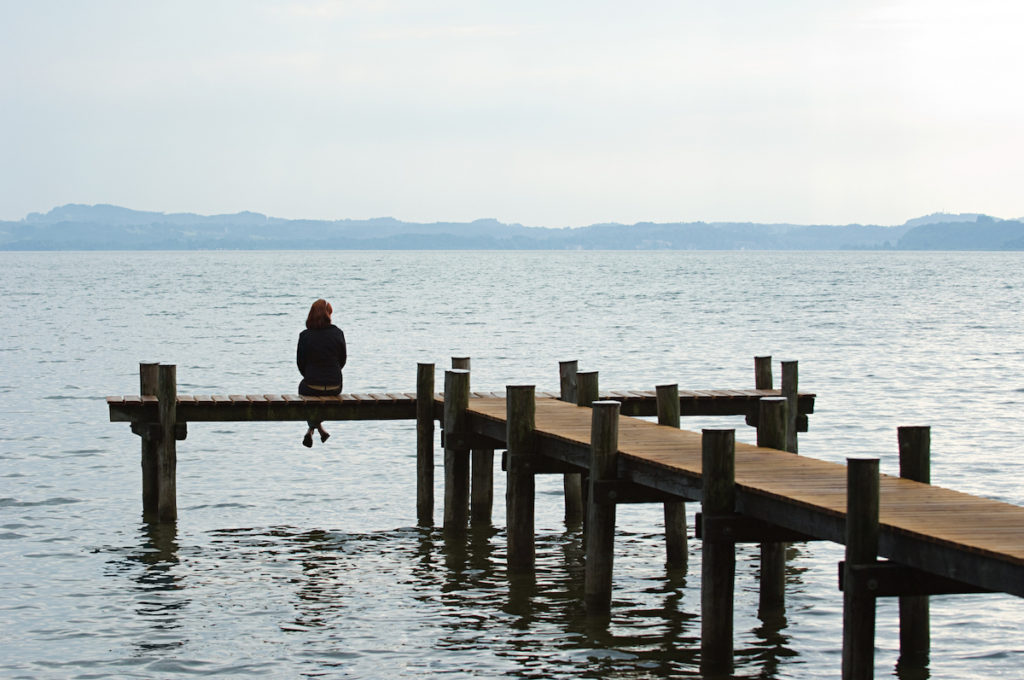One of my favorite authors, F. Scott Fitzgerald once wrote, “The loneliest moment in someone’s life is when they are watching their whole world fall apart, and all they can do is stare blankly.” In active addiction, the world around us crumbles: We can lose relationships, jobs, marriages, custody of children, our health, our sanity and our happiness. So often, we lose everything that makes our life valuable, balanced and worth living – yet we can’t seem to break the cycle. In active addiction, we keep doing the same things over and over again, knowing that everything is falling apart. In active addiction, we’re trapped in loneliness and feel as though we can do nothing but watch our own lives from the sidelines. The crossroads of loneliness and addiction is a place where so many people find themselves trapped. Addiction robs us of our ability to connect and the inability to relate to others make us feel like an outsider – even in our own bodies. Addiction and isolation are cyclical and being trapped in the pattern can make reaching out for help seem impossible. If you are struggling with an addiction, you may have heard it said that you’re not alone. While it may be hard to believe, consider these statistics:
Alcohol Addiction Statistics
Alcohol is not only legal, it’s the most commonly-used drug in the United States. You may wonder why friends or family can drink a glass of wine or a few beers without the same kinds of effects you experience – and wonder why you can’t just have one or two like them. While many people who try and consume alcohol don’t develop an addiction, some people are genetically or mentally predisposed to consuming alcohol in an abusive manner:
- Alcohol dependence will affect roughly 17% of the U.S. population at some point – meaning more than one out of six people will experience alcohol dependence.
- Nearly 15 million people in the U.S. can be diagnosed with an alcohol addiction.
- The CDC reports alcohol use as the third highest cause of death in the United States, with nearly 88,000 deaths related to alcohol use each year.
- In 2008, nearly one in four people who admitted to publicly funded substance use treatment programs admitted for only alcohol addiction – and another 18.3% for alcohol and another drug.
Drug Addiction Statistics
- Nearly 1 in 10 Americans over the age of 12 reported using illicit drugs in 2016 (NSDUH)
- An estimated 6.5 million people in the U.S. report current, nonmedical use of prescription drugs, including painkillers, tranquilizers, stimulants and sedatives.
- In 2013, 22.7 million Americans needed treatment for a substance use disorder – nearly 1 in 10 people over the age of 12.
Millions of Americans are in active addiction. Millions of Americans are also in recovery from drug and alcohol addiction. Millions more have a loved one affected by drug or alcohol addiction. Wherever you are and wherever you look, it is likely that underneath everything, there is likely someone else dealing with similar issues. It’s easy to get trapped in the mindset that no one else has been through our struggles and that no one else could possibly relate. Sure, no one has filled your shoes before, but they’ve walked the same path with the same obstacles, fears, trauma or struggles. You are not alone in your fight – and today is a great day to fight. Below are three things to keep in mind when breaking the cycles of addiction and isolation:
- Addiction is not an anomaly. Addiction crosses all the boundaries of our society: socio-economic, race, gender, nationality, education and so on. Consider it this way: 1 in 10 teachers, 1 in 10 business executives, 1 in 10 college graduates, 1 in 10 dentists – are all prone to addiction. Roughly 10% of the U.S. population struggles with drug or alcohol addiction. To put that in perspective, only about 7% of the population suffers from diabetes.
- You are not alone. Most people who suffer from addiction also suffer from a profound sense of loneliness. Even if you have many friends or are often in social settings, you may feel as though you are alone, different or don’t belong. You are not the only person who feels this way – and when you recognize that others experience the same clutter and self-doubt in their own minds, you’ll be able to set yourself free from your own thoughts. In recovery, you’ll be able to develop a network of true friends who can relate to these feelings; friends that you can reach out to or go to a meeting with. Breaking the cycle of loneliness can break the cycle of addiction and you will feel the power of your connections on a daily basis.
- You are more than your addiction. So often, the stigma of addiction shames us into believing that the only thing we have to offer this world is our addiction. Shame-filled stigmatizing labels like, “addict” and “junkie” are commonly thrown around – and those who don’t understand addiction may say that it’s a choice. You may struggle with alcohol or drug use and addiction – but it doesn’t define your existence. Understand that your addiction does not define you; your life is more than a pill or a drink or a needle. You are valuable. You are a mother, father, husband, friend, daughter, brother, artist, lawyer, Christian, neighbor – you are not an “addict.”


